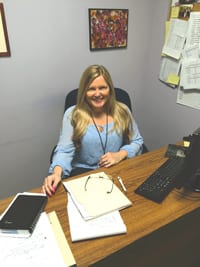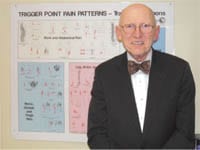After the Diagnosis – West Central Family and Counseling Launches Cancer Program
As a provider of psychotherapy services for patients of all types, the therapists at West Central Family and Counseling observed a striking trend, said Jo-Anne Gaughan-Cabral.
“We noticed, from referrals coming into the clinic, that a growing number of people had been treated in the past, or were currently being treated, for various cancer diagnoses,” said Gaughan-Cabral, clinic supervisor and clinical lead of what is being called the facility’s Cancer Informed Therapy Program. “Although we were already treating the mental-health needs of these people, we decided to develop a more specialized cancer-focused therapy, and we set out to train a group of people to work with patients with cancer.”
West Central Family and Counseling’s (WCFC) new mental-health treatment program is targeted specifically for not just cancer patients, but their families, caregivers, and loved ones.
“The goal of the program is to provide patients and their families cancer-informed therapy. We can accomplish this in the clinic and as a home-based support when it seems needed,” said Gaughan-Cabral. “Clients and family members who are affected by a cancer diagnosis will benefit from this program.”
The effort represents a response of sorts to a 2006 Institute of Medicine report recommending that every cancer patient receive a cancer-survivorship care plan.
“We’re the psychotherapy component for people dealing with depression, anxiety, body-image issues, and needing cognitive behavioral therapy from managing the side effects of chemotherapy, such as nausea,” Gaughan-Cabral said. “We’ve been able to coordinate with other programs like Survivorship Journeys and therapy groups, as well as mentors, people who’ve already had the diagnosis and can walk other people through it. We’re basically trying to treat all the needs of the patient — and their family — as they deal with the negative feelings associated with grief and loss, change in roles, and other issues.”
Those issues certainly affect a patient’s loved ones, as all parties struggle with unfamiliar roles, she added, whether that’s parents caring for sick children or grown children managing a cancer journey for their elderly parents. In any case, a cancer diagnosis can be a challenging experience for all, and many clients have reported feelings of anxiety and depression along with grief, stress, episodes of confusion, and acute or reoccurring trauma, she explained.
The team of cancer-focused therapists at WCFC, who undergo a six-month training to be part of the program, work to help patients process the emotional issues that surface during this time, and, if necessary, provide consultation to those providing their medical treatment at local cancer-treatment centers.
Gaughan-Cabral added that, while patients currently undergoing treatment for cancer will be well-represented in the program, most of the participants will likely be survivors who are past their initial treatment. “In the midst of treatment, they’re not feeling well, and they may not feel like talking to someone, but once they’re on the other side, they realize life has changed so much, so we try to pick up with them on whatever they need.”
Those needs are myriad, she said. “How do I go back to work? How do I resume an intimate relationship with my spouse? How do I get back to an active life? Having faced this life-or-death situation, you’re changed by that, and you need new strategies to deal with your world.”
Common Concerns
According to the American Psychiatric Assoc. (APA), general emotional distress, poor coping strategies, and psychiatric disorders such as anxiety and depression are common in cancer patients — perhaps 25{06cf2b9696b159f874511d23dbc893eb1ac83014175ed30550cfff22781411e5} to 30{06cf2b9696b159f874511d23dbc893eb1ac83014175ed30550cfff22781411e5} of them. Depression can not only negatively impact cancer patients’ quality of life, but can reduce their chances of survival, just as it can in heart-disease patients, Dr. David Spiegel, associate chair of Psychiatry at Stanford University and a psycho-oncologist, told Psychiatric News, an APA publication.
Yet, effective treatment of depression may increase the chances of survival. A study conducted by Spiegel and his colleagues in 2010 found that a decrease in depression symptoms was associated with longer survival in metastatic breast-cancer patients. Research during the past decade has also shown that various psychotherapies developed for cancer patients can improve patients’ quality of life, the APA reported.
The fact that more people are surviving cancer diagnoses makes WCFC’s cancer program even more relevant, said Gaughan-Cabral, who noted that referrals come in from hospitals, community-based programs, and simple word of mouth.
To better communicate how the program can help a wide range of cancer patients, survivors, and caregivers, West Central will host an open house on Thursday, May 18, from 8 to 9 a.m. for cancer-treatment professionals interested in learning more about the new program, with the hope they will like what they hear and be willing to refer their patients. Meetings with clinical staff, refreshments, and tours will be available as well. The site is located at 103 Myron St., Suite A, in West Springfield.
“We want people who treat cancer — social workers, oncology units, therapists — to see our clinic and come meet with our staff, and make a personal connection,” said Joshua Frank, WCFC’s recruitment and marketing manager.
In addition to the therapeutic services offered on site, outreach and home-based support appointments are available when needed, Gaughan-Cabral said. “For those not able to get to the clinic for the support they need — for example, if they can’t drive — we go out to be with them. That’s one of our strong suits.”
Beyond its new cancer-focused program, West Central provides psychotherapy services to children, adolescents, adults, and elders with a wide range of behavioral-health issues, and also collaborates with schools and community centers to provide additional services, Frank said. But the Cancer Informed Therapy Program is meeting a specific need that isn’t being addressed on a larger scale, Gaughan-Cabral added.
“Feedback so far has been very positive,” she told HCN, adding that the center plans to hire and train more people in this discipline once referrals necessitate a waiting list. “We’ve been so supported by people in the community, and that makes us feel positive about what we’re doing. It’s something that’s really necessary.”





Comments are closed.